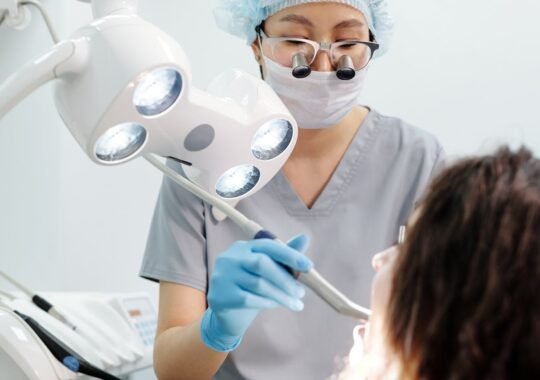Table of Contents
-
Why Oral Health Matters
-
Daily Oral Care Regimen
-
Diet and Oral Health
-
Common Dental Problems and Prevention
-
Importance of Regular Dental Checkups
-
Choosing the Right Dental Products
-
Oral Health for Different Life Stages
-
Frequently Asked Questions
Why Oral Health Matters
Preserving good oral health goes beyond just having a white smile. It affects overall wellness, as oral diseases can lead to health issues like cardiovascular disease and diabetes. The Centers for Disease Control and Prevention have stated that poor oral health is frequently associated with other health issues. It underscores the need for regular dental care and proper oral hygiene. To support your oral health, consider enrolling in a comprehensive dental plan like FEDVIP Dental, which offers extensive coverage for federal employees. Such plans typically cover routine checkups, cleanings, and other essential dental services that can help prevent serious health issues.
Maintaining good oral health is essential for overall well-being, not just for preventing cavities. Consistent brushing and flossing can help avoid gum disease linked to severe health issues like stroke and respiratory diseases. If gum disease is not taken care of, it may lead to more severe health problems, such as compromised immune systems and difficulties with chronic conditions such as diabetes. Therefore, taking good care of your teeth and gums is fundamental to maintaining a healthy body. A healthy mouth can improve your self-esteem and quality of life, making daily interactions more pleasant.
Daily Oral Care Regimen
Regular and efficient dental hygiene is essential for keeping teeth and gums healthy. Fluoride helps to strengthen tooth enamel, boosting its ability to resist decay. A WebMD article highlights the importance of fluoride in preventing tooth decay and suggests its regular use. This daily regimen forms the cornerstone of oral health maintenance, targeting the primary causes of tooth decay and gum disease.
-
Make sure to brush your teeth entirely for at least two minutes, ensuring you cover all areas of your teeth. It’s essential to brush not just your teeth but also your tongue and gums to remove bacteria.
-
Using dental floss can eliminate plaque and food debris that your toothbrush cannot reach. Flossing prevents plaque buildup, which can harden into tartar and lead to gum disease.
-
Use mouthwash to help reduce plaque and keep your breath fresh. Mouthwash can help manage oral bacteria, reduce bad breath, and give your mouth an extra clean feel.
Adding these tasks to your daily schedule can greatly enhance dental wellness, assisting in keeping a fresh and healthy mouth. Adopting these habits is simple, and they can help avoid expensive dental treatments. Integrating these practices makes them part of your daily routine for the best results.
Diet and Oral Health
Consuming a well-rounded diet with ample nutrients is essential for good oral health. High levels of sugar and acids in foods may lead to tooth decay and erosion. Conversely, fruits, vegetables, and dairy products promote healthy teeth and gums. A nutrient-rich diet supports overall health, thereby enhancing oral health as well.
-
Reducing sugary snacks and drinks can lower the chances of developing cavities. Sugars contribute to the formation of acids that erode tooth enamel.
-
Include plenty of calcium-rich foods like cheese and yogurt for strong teeth. Calcium helps to strengthen the structure of teeth and bones.
-
Eat hard fruits and vegetables like apples and carrots. They assist in cleaning teeth as you chew. These foods can stimulate saliva production, which aids in reducing harmful acids in the mouth.
A balanced diet supports physical health and maintains strong and healthy teeth. Including various nutrients in your diet ensures your body has what it needs to keep your teeth and gums in excellent condition. Moreover, good dietary habits can enhance your immune system, making fending off infections, including those in your mouth, easier.
Common Dental Problems and Prevention
Understanding common dental issues such as cavities, gum disease, and tooth sensitivity can help take preventive measures. Regular brushing, flossing, and dental checkups prevent these problems. Awareness and proactive care can drastically reduce the risk of these common dental issues.
Cavities
Cavities, or tooth decay, occur when plaque builds up on teeth, producing acids that erode the enamel. The process starts with the bacteria in the plaque metabolizing sugars to produce acid, which gradually demineralizes the enamel. To prevent cavities, ensure you brush and floss daily and reduce your sugar intake. It is essential to have routine dental appointments for cleanings and checkups to detect cavities promptly.
Gum Disease
Failure to treat gum disease may result in tooth loss as it is an infection that affects the gums. It begins with gingivitis, identified by red, swollen gums that may bleed. Regular dental cleanings and a proper oral care routine can help prevent gum disease. Early intervention is critical to stopping gum disease from advancing and causing more severe health issues.
Tooth Sensitivity
Spicy, chilly, sugary, or tangy food and beverages may cause tooth sensitivity. It commonly occurs when the enamel that protects our teeth gets thinner, or gum recession exposes the underlying dentin. Utilizing sensitive toothpaste and avoiding hot or cold foods can help ease pain. Additionally, avoiding acidic foods and drinks can prevent further enamel erosion.
Importance of Regular Dental Checkups
Regular dental appointments are crucial for catching and treating possible oral health problems early on. Dentists can provide professional cleanings, identify problem areas, and offer advice on better dental practices. Regular professional cleanings can eliminate plaque and tartar that may not be removed by everyday brushing and flossing.
Dental professionals can spot problems before they become severe and provide treatments such as fluoride applications and sealants to protect teeth from decay. Regular checkups also include oral cancer screenings, helping to detect any signs of cancer early, when treatment is more likely to be successful.
Choosing the Right Dental Products
Selecting the appropriate dental care products for your needs is essential. Look for toothbrushes with soft bristles, fluoride toothpaste, and dental floss. Soft-bristled toothbrushes are gentle enough to protect your gums and firm enough to clean your teeth effectively. Remember the significance of dental tools like water flossers and interdental brushes for enhanced care. These tools can reach areas that regular floss might miss, providing a more thorough clean.
-
Soft-bristled toothbrushes are gentle on gums while effectively cleaning your teeth. They prevent gum abrasion while removing plaque efficiently.
-
Fluoride toothpaste helps strengthen enamel and fight cavities. Fluoride aids in remineralizing tooth enamel, helping to reverse early decay.
-
Interdental brushes and water flossers can reach areas that regular floss might miss. These tools can be handy for individuals with braces or other dental appliances.
Selecting appropriate products customized to your requirements can enhance oral health and avoid potential dental problems in the future. Consistency in using these products and proper techniques ensure optimal oral health benefits.
Oral Health for Different Life Stages
Oral health needs vary at different stages of life. Children may require sealants to prevent cavities, while adults need to be vigilant about gum disease. Seniors, on the other hand, may experience dry mouth or wear dentures. Tailoring care to each life stage ensures optimal oral health across the lifespan. Understanding these needs can help caregivers and individuals make better health decisions at each stage.
Children
Children benefit from preventive measures like dental sealants and fluoride treatments. Frequent dental appointments starting at a young age can assist in forming positive oral hygiene routines. Fluoride helps strengthen young enamel, while sealants protect the grooved and pitted areas prone to cavities.
Adults
Adults should focus on maintaining gum health and preventing decay. Regular cleanings and correct brushing and flossing methods are essential. Adults are also at risk for periodontal disease, so maintaining healthy gums through professional care and diligent oral hygiene is necessary.
Seniors
Older adults may face unique challenges like dry mouth and the need for dentures. Proper hydration, saliva substitutes, and regular dental checkups can help manage these issues. Seniors should also be mindful of the fit and cleanliness of their dentures to avoid sores and infections.
Frequently Asked Questions
-
What is the best toothbrush for me? Select a toothbrush that has gentle bristles and an ergonomic handle. It’s essential to select one that you will use consistently, ensuring it fits well in your hand and allows access to all parts of your mouth.
-
How often should I visit the dentist? – Visiting the dent that you have every six months is recommended for checkups and cleanings. However, those with specific dental issues or risk factors may need more frequent visits.
-
Can diet affect my oral health? Yes, a balanced diet can significantly improve oral health. Critical nutrients for oral health include calcium, phosphorus, and vitamins A, C, and D. These nutrients help maintain enamel, support gum health, and promote the regeneration of soft tissues.





